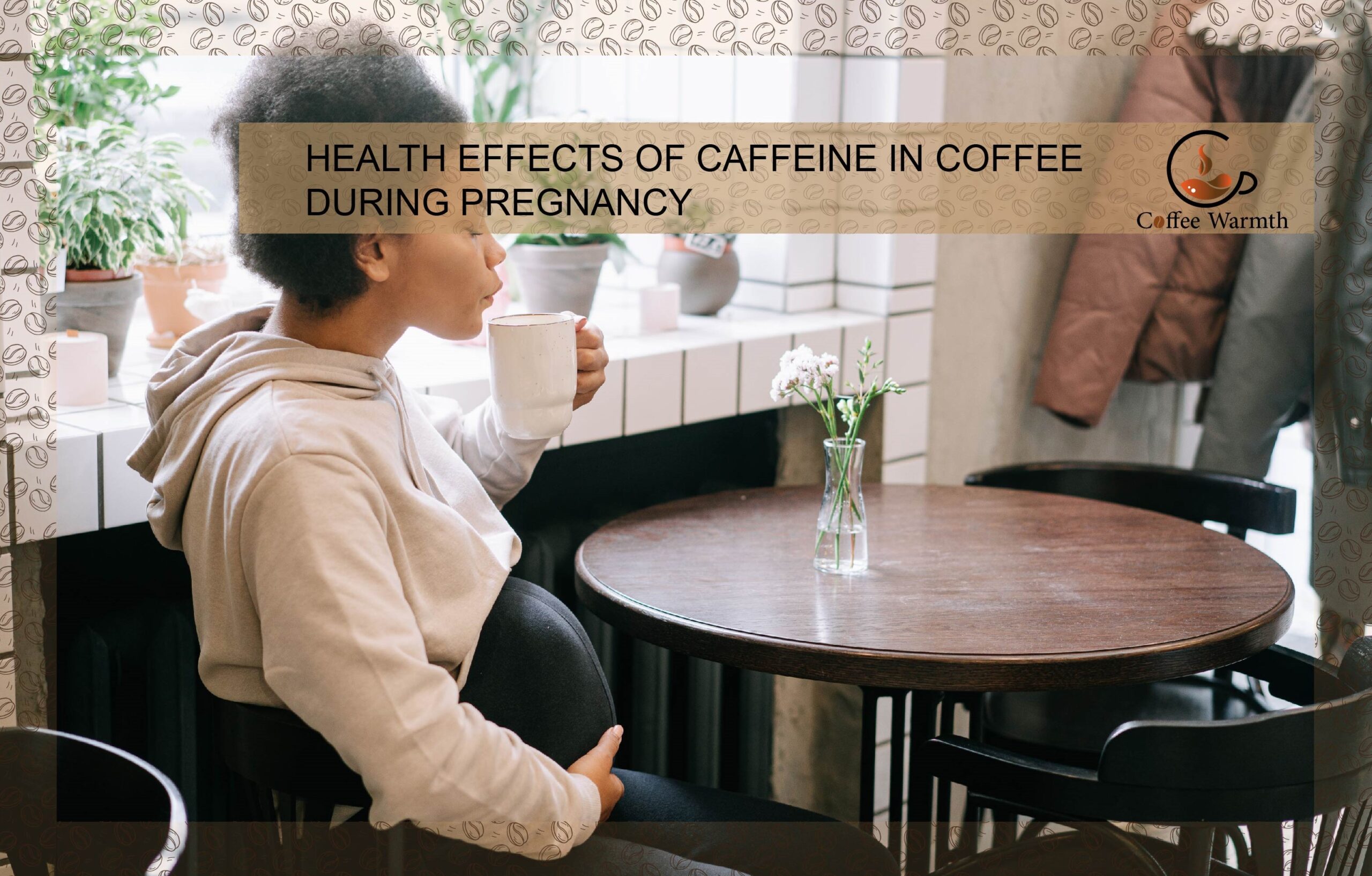The term pregnancy is used to describe the 9 months and 40 weeks time period in which a fetus grows inside a woman’s womb. Pregnant females are vulnerable beings and require extra care in all aspects of life including nutrition. The US Department of Health and Human Services suggests pregnant women to eat healthy food, avoid raw food and unpasteurized milk, and limit drinks with caffeine and sugar.
Pregnant females are more sensitive to caffeine because their bodies take more time to metabolize it. So, drinking coffee can have many adverse effects during pregnancy ranging from moderately threatening symptoms like nausea and stomach pain to dangerous effects like miscarriage and spontaneous abortion.
However, you don’t need to quit coffee altogether because the US Food and Drug Administration (FDA) allows 200 mg caffeine or 2-3 cups (16-24 fl.oz.) of coffee per day for pregnant ladies. It’s best to keep in track caffeine content of every food and drink you consume and make sure not to go past the recommended amount to save yourself and your baby.
What are the effects of drinking coffee during pregnancy?
These are the effects of drinking coffee during pregnancy.
1. Dizziness
2. Headache
3. Nausea
4. Stomach Pain
5. Diarrhea
6. Frequent Urination
7. Coffee Jitters
8. Cramps
The following image below shows the effects of drinking coffee during pregnancy.
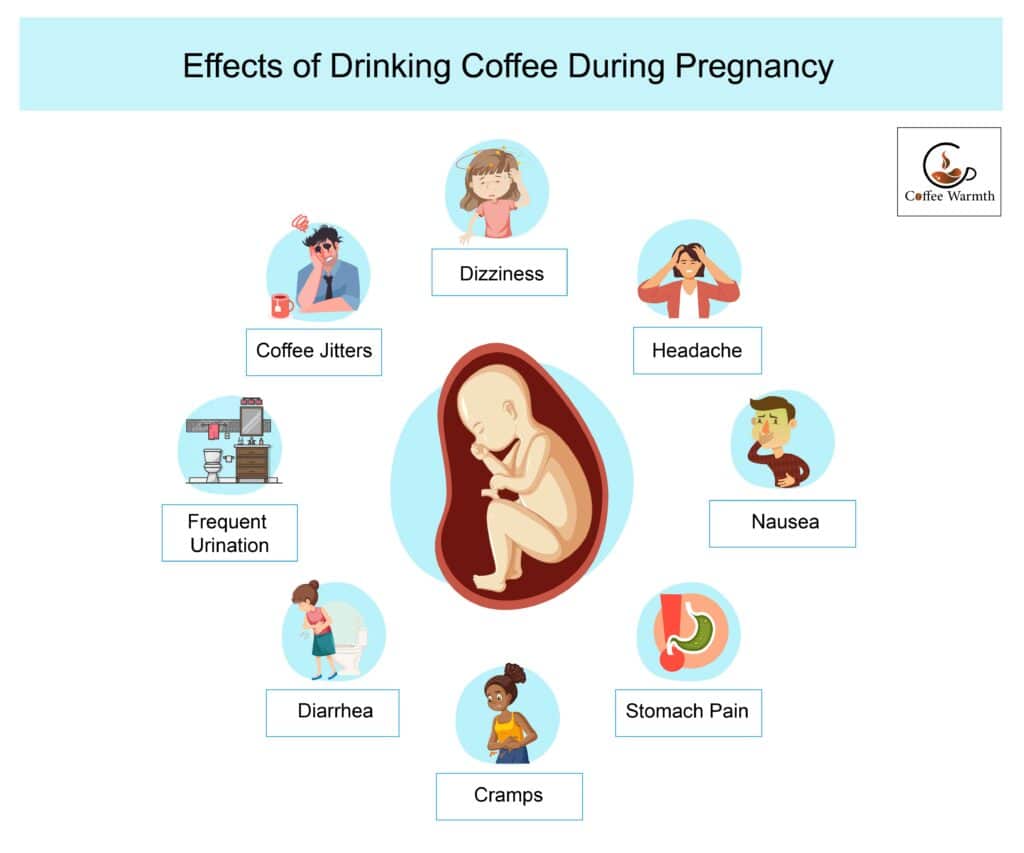
Researches from Brazilian Journal of Otorhinolaryngology, Journal of Headache and Pain, Journal Neurology, Journal of Clinical Anesthesia, Journal of The College of Family Physicians of Canada, Journal of Best Practice & Research Clinical Gastroenterology, Malaysian Journal of Medicine and Health Sciences, BMC Gastroenterology, Journal Nutrients, The American Journal of Gastroenterology, Journal of Human Nutrition and Dietetics, Journal of Urology, Journal of Child & Adolescent Substance Abuse. Journal of Clinical Psychology. American Journal of Medicine
1. Dizziness
Dizziness describes a range of feelings like feeling unsteady, woozy, weak or faint. Dizziness leads to disruption of balance and disorientation in space.
Drinking coffee can cause dizziness in pregnant females due to caffeine’s vasoconstrictive properties in response to initial vasodilation leading to reduction in cerebral blood flow.
Nearly 50% women experience dizziness during pregnancy in the 1st and 2nd trimester which is aggravated by coffee consumption according to a study in the Brazilian Journal of Otorhinolaryngology. However, dizziness due to coffee can occur in any trimester during pregnancy. The risk and extent of dizziness depends on varying underlying factors like a female’s blood pressure, hormonal changes, and caffeine’s half life. The average half life of caffeine during pregnancy is 11.5 – 18 hours. So, the effect of coffee on dizziness lasts longer in pregnant females.
2. Headache
Headache is defined, medically, as pain or discomfort arising from pain-sensitive structures in the head.
Out of the 4 main causes of headache, excessive use of coffee (>2 cups i.e., >16 fl.oz.) or its abrupt cessation are the most common causes of headache in pregnant females. According to a study in the Peer-reviewed Journal Neurology, regular caffeine consumption is a risk factor for daily headaches in all individuals including pregnant females.
Pregnant females consuming coffee regularly face withdrawal headaches on abrupt cessation. An abrupt stop to coffee consumption leads to increased sensitivity to adenosine’s physiological effects on cerebral blood vessels. Adenosine causes rebound dilation of cerebral blood vessels which increases blood flow and pressure on surrounding nerves leading to withdrawal headache, as stated by Dr. Michael Muhonen, a neurosurgeon.
A study published in the Journal of Headache and Pain showed that pregnant women abruptly stopping caffeine consumption of as little as 100 mg/day experience headache, fatigue, and mood disturbance. Caffeine withdrawal in pregnant ladies causes withdrawal symptoms like headache and mood disturbances, according to another study in the Journal of Clinical Anesthesia.
The image shown below shows how caffeine withdrawal can cause headache during pregnancy.
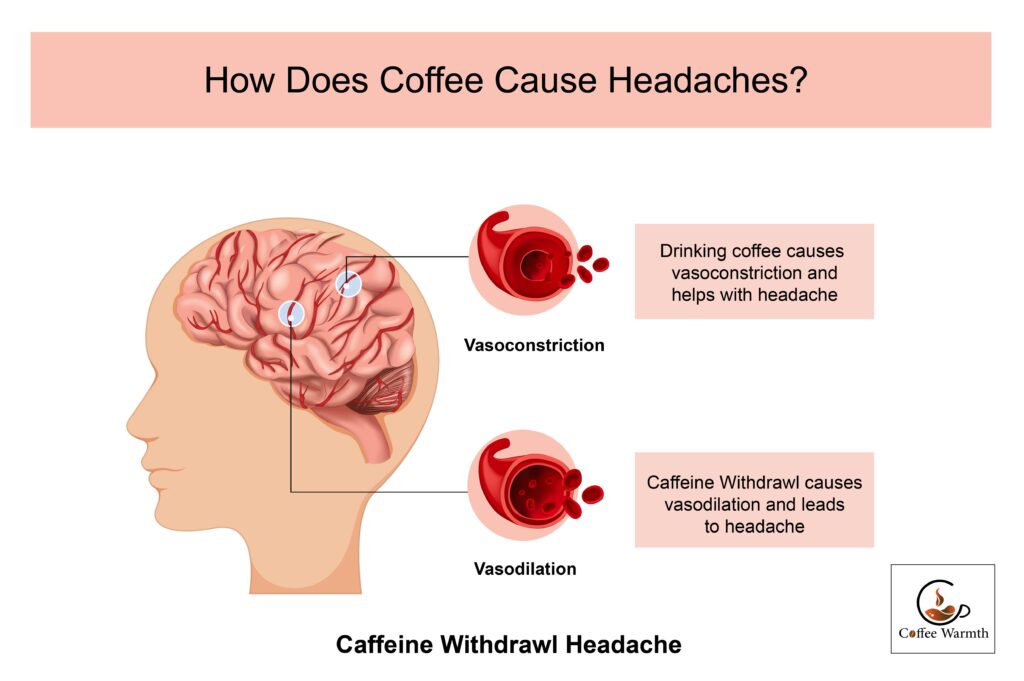
3. Nausea
Nausea is defined as a feeling of queasiness or a discomfort in the stomach and upper abdomen accompanied with the urge to vomit and loathing for food.
Drinking coffee causes nausea in pregnant women due to gastroesophageal reflux disease (GERD), acid reflux, heartburn, and interaction with certain medications.
Drinking coffee causes gastroesophageal reflux disease (GERD), acid reflux, and heartburn during pregnancy due to the acidic nature of both coffee and the stomach. GERD occurs in about 80% of pregnancies which causes acid reflux and heartburn, according to a study published in the Journal of Best Practice & Research Clinical Gastroenterology. Heartburn and acid reflux causes increased nausea and vomiting in pregnant females, as mentioned by a study in the Journal of The College of Family Physicians of Canada.
It is common among pregnant women to be on certain medications. Caffeine’s interaction with certain medications can also make you nauseous, says Dietitian and Clinical Herbalist Jenna Vlope.
4. Stomach Pain
Stomach pain or abdominal pain is pain anywhere between the chest and the groin. Harmless stomach pain during pregnancy is due to hormonal changes, constipation, or stretching of round ligaments. Serious stomach pains can be a sign of miscarriage, ectopic pregnancy, or placental abruption.
Drinking coffee increases stomach pain during pregnancy due to gastric ulcers, indigestion, and gastroesophageal reflux disease (GERD).
Drinking coffee causes stomach pain in pregnant females due to gastric ulcers. Coffee increases the production of gastric acid. High levels of gastric acid damages the stomach lining leading to gastric ulcer formation, according to a study in the Malaysian Journal of Medicine and Health Sciences.
Drinking coffee during pregnancy may also exhibit symptoms of indigestion like stomach pain, heartburn, and stomach fullness.
Furthermore, drinking coffee aggravates the abdominal pain due to GERD in pregnant women. According to a study published in BMC Gastroenterology, GERD symptoms cause stomach pain more often in pregnant women than in non-pregnant women.
The diagram below summarizes how drinking coffee can cause stomach pain.
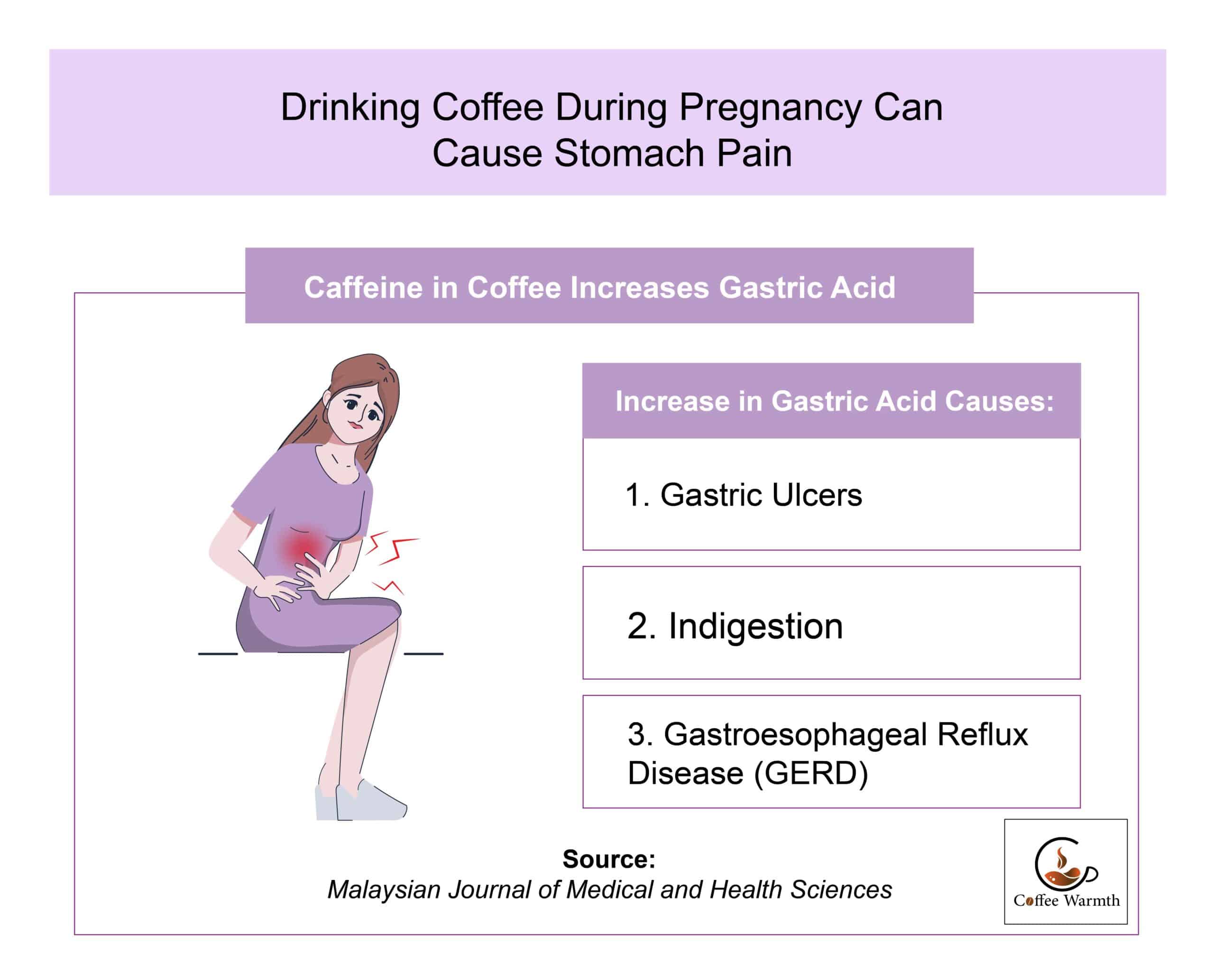
5. Diarrhea
Diarrhea is loose, watery stools passed three or more times a day. Diarrhea is common during pregnancy due to hormonal changes, infections, bowel disorders, diet or prenatal vitamins. Diarrhea can happen in any trimester but it’s more common in the third trimester.
Drinking more than 2 or 3 cups (16-24 fl.oz.) of coffee during pregnancy daily can cause diarrhea due to the laxative potential of coffee. Caroline Bletcher, a Registered Dietitian, says that drinking coffee speeds up colonic motility. It speeds up transit through the bowel, urging you to defecate within 4 minutes of coffee ingestion, according to a study published in the Journal Nutrients.
According to The American Journal of Gastroenterology, pregnant females having diarrhea should stop drinking coffee as it can worsen the condition and even lead to dehydration.
6. Frequent Urination
Frequent urination is to pee more often than you normally do in a day. People urinate between 4 and 10 times a day, with an average of 6-7 trips per day.
Drinking coffee causes frequent urination in pregnant women due to the diuretic nature of caffeine, hormonal changes, and pressure of the fetus on the bladder. Thus, drinking coffee fills up the bladder of pregnant women quickly and increases their trips to the bathroom.
Dr. Rena Malik, Urologist and Assistant Professor at University of Maryland School of Medicine, says that caffeine causes bladder contraction which urges one to urinate. Drinking 2-3 cups (16-24 fl.oz.) of coffee or 250-300 mg caffeine causes a short time increase in urine output, a study in the Journal of Human Nutrition and Dietetics concludes.
Pregnant females have an increased urge to urinate in the third trimester due to growing pressure of the fetus on the bladder. According to a study published at the Journal of Urology, high caffeine intake increases incidence of urge incontinence.
7. Coffee Jitters
Coffee jitters means the feeling of anxiety and nervousness after drinking coffee. There are some physical symptoms associated with coffee jitters like shakiness, tremors, perspiration, and rapid heart rate. Pregnant women drinking coffee during pregnancy are more prone to anxiety symptoms, according to the Journal of Child & Adolescent Substance Abuse.
Drinking coffee can cause coffee jitters during pregnancy if the caffeine consumption is above the FDA recommendation of 200 mg per day, as found in a study in the Nutrients Journal.
1 out of 5 pregnant women have an anxiety disorder and drinking coffee triggers anxiety accompanied with jitteriness in these women, according to a study in the Journal of Clinical Psychology.
During pregnancy, coffee jitters last longer because of the extended half life of caffeine i.e. 10.5 hours compared to the normal 6 hours.
The diagram below illustrates summarizes how drinking coffee can cause coffee jitters during pregnancy.
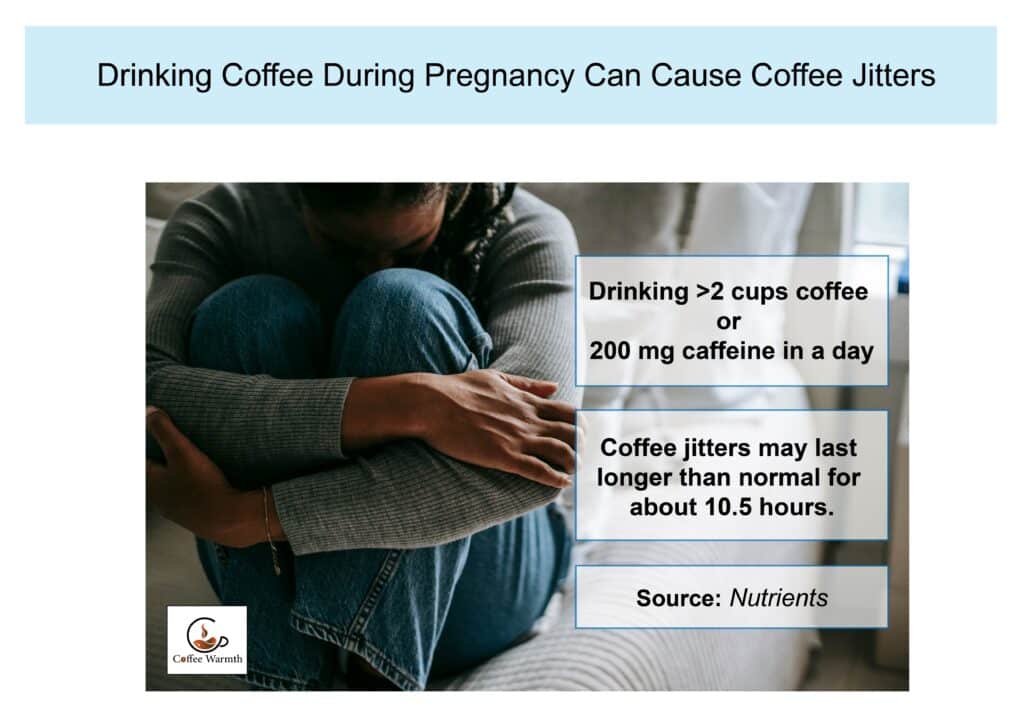
8. Cramps
A cramp is defined as muscle tightening due to a sudden, involuntary spasmodic contraction of a muscle. Cramps are common during pregnancy especially in the second trimester due to serum electrolyte imbalance of calcium, magnesium, and potassium.
Drinking coffee during pregnancy can aggravate the incidence and intensity of cramps due to muscle stimulation and diuresis.
Caffeine in coffee stimulates muscle and increases calcium levels which can lead to leg cramps, according to a case study in the American Journal of Medicine. The study suggests that stopping caffeine consumption relieves the leg cramps.
Drinking coffee in pregnant females causes diuresis by the action of caffeine on bladder contraction. Increased diuresis results in loss of fluids and serum electrolytes. Loss of fluids and serum electrolytes disturbs the body’s electrolyte balance leading to cramps.
What are the dangerous effects of drinking coffee while pregnant?
The dangerous effects of drinking coffee while pregnant are miscarriage, spontaneous abortion (SAB), low birth weight, small birth stature, and delayed neonatal response in babies. Body metabolizes caffeine slower during pregnancy so it causes dangerous effects in both mothers and babies.
The image below lists the dangerous effects of drinking coffee during pregnancy.
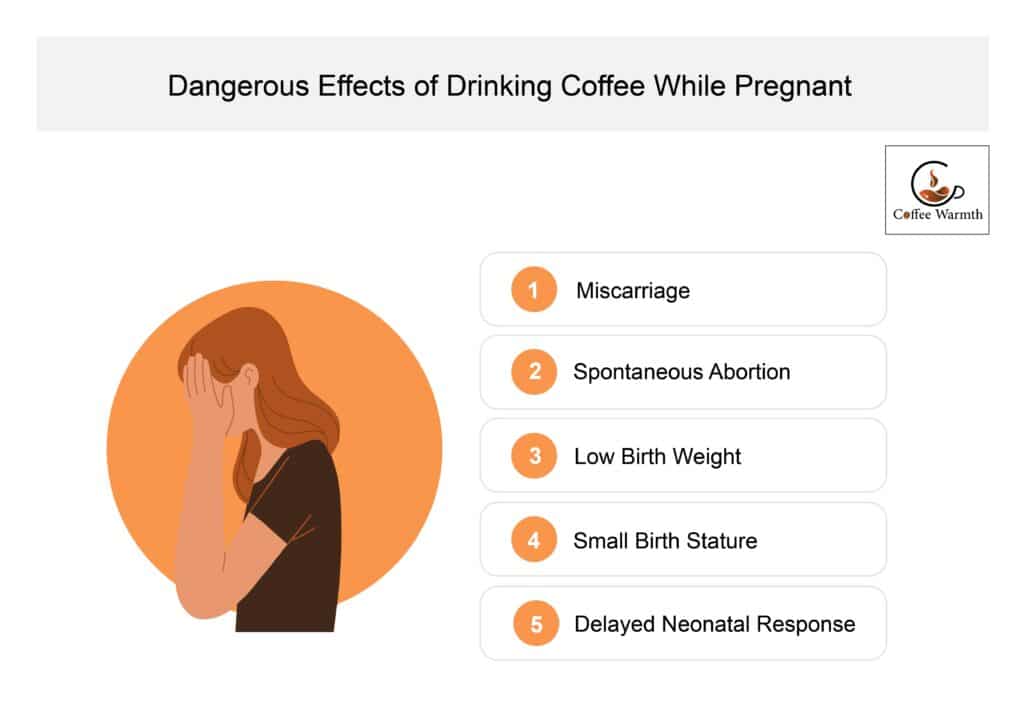
According to a study from the National Health Institute, pregnant women who drank more than 2 caffeinated beverages a day were at a high risk of miscarriage. Drinking 3-4 cups (24-32 fl.oz.) of coffee or more than 321 mg/day caffeine doubles the risk of spontaneous abortion (SAB) according to the study published in Journal of the American Medical Association (JAMA).
One of the common dangerous effects of drinking coffee during pregnancy is low birth weight and small birth stature. According to the National Institutes of Health (NIH) news release, pregnant women consuming caffeine gave birth to infants who were 84 grams (3 ounces) lighter, 0.44 cm (0.17 in) shorter, and had 28 cm (0.11 in) shorter head circumference.
Another dangerous side effect of drinking coffee during pregnancy is delayed neonatal response after birth. According to a study published at University of Utah in 2018, caffeine can disrupt fetal stress hormones affecting baby’s response to stress after birth.
The dangerous effects of drinking coffee while pregnant for mothers is increased blood pressure, rapid heart rate, dehydration, and anxiety attacks. A study in the American Journal of Hypertension states pregnant women drinking more than 2 cups (16 fl.oz.) of coffee had elevated systolic blood pressure compared to those drinking less than 2 cups (16 fl.oz.).
Can drinking coffee cause miscarriage?
Drinking coffee may or may not cause miscarriage depending on your daily consumption. Gene Burkett, MD, Professor of Obstetrics and Gynecology at Miller School of Medicine states that drinking 1-2 cups(8-16 fl.oz.) of coffee or 100-200 mg caffeine daily does not increase the risk of miscarriage.
The risk of miscarriage increases only when you drink more than 2 cups of coffee a day. According to a study in Peer-reviewed Journal “Paediatric and Perinatal Epidemiology”, it was found that caffeine consumption of more than 300 mg doubles the risk of miscarriage compared to 150 mg caffeine a day.
How does caffeine affect fetus?
Caffeine affects the fetus by passing freely through the placenta to the fetus. When you drink coffee, your body can metabolize caffeine but the fetus can not. Caffeine causes vasoconstriction in the uterus and placenta which can inhibit fetus growth.
According to the Journal: Trends in Endocrinology and Metabolism, caffeine during pregnancy can cause fetal growth retardation and low birth weight. Daily maternal caffeine consumption is also associated with shorter stature of the baby which persists into childhood, according to the Journal of the American Medical Association.
How much caffeine is safe during pregnancy?
The safe amount of caffeine during pregnancy is 200mg or two cups (16 fl.oz.) of drinking coffee, according to both NHS and American College of Obstetricians and Gynecologists (ACOG).
Krzysztof M Kuczkowski, from University of A Coruña, Galicia, suggests that pregnant women limit coffee consumption to 3 cups/day (24 fl.oz.) or 300 mg/day caffeine to exclude any probability of spontaneous abortion or impaired fetal growth.
The diagram below shows the comparison between safe coffee and caffeine intake for pregnant and non pregnant females.
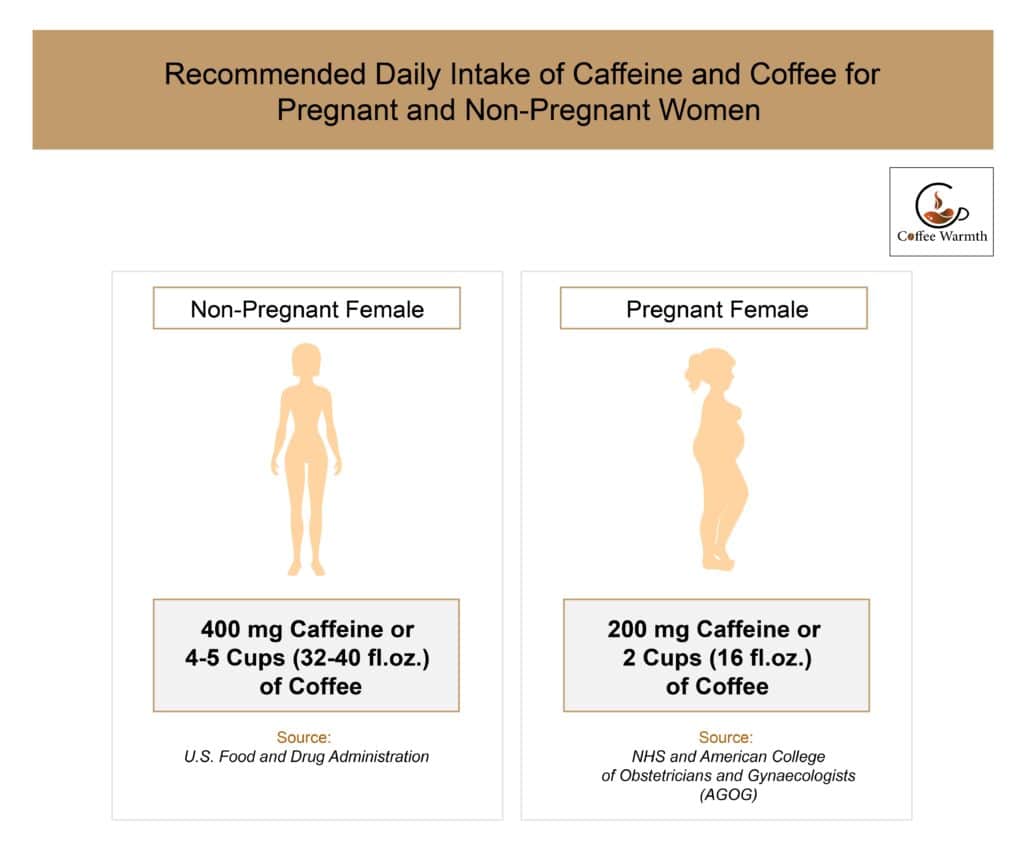
Some research groups suggest that caffeine intake should be <100 mg/day or <one cup (8 fl.oz.) of coffee. Some pregnant women are more sensitive to caffeine, so it’s better to consult a healthcare professional about your daily caffeine intake to stay safe from caffeine overdose.
What foods and drinks contain caffeine? H3
The following foods and drinks shown in the table below contain different caffeine content according to the data by U.S. Department of Agriculture (USDA)
| Foods/drinks | Grams (g) | Caffeine(mg) |
| Chocolate Bar (70-85% cocoa) | 100 | 80 |
| Chocolate Ice cream | 100 | 3 |
| Black Coffee | 100 | 40 |
| Black Tea | 100 | 11 |
| Carbonated Beverage (Cola) | 100 | 9 |
| Energy drinks (Red Bull) | 100 | 29 |
Can you have caffeine while breastfeeding?
Yes, you can have moderate amounts of caffeine while breastfeeding. Lactating women can consume less than 300 mg caffeine or 2-3 cups (16-24 fl.oz.) of drinking coffee, according to the USA Centers of Disease Control and Prevention (CDC). The European Food Safety Authority limits the amount to 200mg caffeine or 2 cups (16 fl.oz.) of coffee daily for lactating mothers.
It is recommended to breastfeed the baby before consuming caffeine or 3 hours after caffeine intake. It prevents caffeine traces (1.5% of maternal caffeine dose) from transferring to the breast milk.
Are there any potential benefits of drinking coffee during pregnancy?
Yes, there are some benefits of drinking coffee during pregnancy. The most prominent of the 15 benefits of drinking coffee are increased energy, elated mood, decreased chance of diabetes and cardiac issues.
According to a study in the JAMA Network Open, drinking coffee in moderate amounts during pregnancy can reduce the risk of gestational diabetes in the second trimester. Pregnant women consuming moderate amounts of caffeine showed better cardiometabolic profiles compared to those who did not consume caffeine at all.
